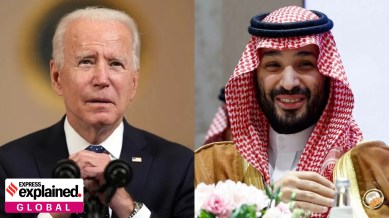Why US is willing to relax its weapons ban on Saudi Arabia
US President Joe Biden once referred to Saudi Arabia as a pariah, and reintroduced the US weapons ban in the first few months of his term. What has changed now?

US Officials announced that the Biden administration is prepared to ease some restrictions on weapons sales to Saudi Arabia, in light of advancing peace talks between Riyadh and the Houthi militia in Yemen.
President Joe Biden had imposed the ban two years ago amidst concerns that US weapons were being used against civilians in Yemen, which is currently in the midst of a catastrophic war.
We take a look at the war in Yemen, Saudi involvement in it, and the United States’ weapons ban against the Saudis.
A bloody civil war in Yemen
Founded in 1990, the modern Yemini state has been plagued by religious and cultural differences between its northern and southern halves. Ali Abdullah Saleh, a military officer who had ruled North Yemen since 1978 initially assumed control over the country but was ousted in 2012 against escalating domestic and international pressure. His vice president, Abd Rabbu Mansour Hadi, assumed office as interim president, lasting two years before he was forced to resign as well.
Hadi’s resignation coincided with the start of Yemen’s civil war in 2014, when Houthi insurgents took control of Yemen’s capital and largest city, Sana’a, demanding a new government. The Houthis, a group of Shiite rebels with links to Iran had been present in Yemen since the 1990s but only assumed power in 2015 after seizing the presidential palace and forcing Hadi and his government to resign.
In early 2015, after escaping from Sana’a, Hadi rescinded his resignation, and began to lead a government in exile based out of Saudi Arabia. Although the international community largely recognises the government in exile, most Yeminis live in areas under Houthi control. Along with Sana’a and the north of Yemen, the Houthis also control the Red Sea coastline.
Saudi involvement
According to analysts, the conflict, which has lasted for seven years, has evolved into a proxy war between a multinational coalition headed by Saudi Arabia, and the Houthi rebels backed by Iran.
In 2015, at Hadi’s request, Saudi Arabia assembled a coalition of Sunni majority Arab countries including Bahrain, Egypt, Jordan, Kuwait, Morocco, Qatar, Sudan, and the United Arab Emirates (UAE). In 2018, Pakistani and Eritrean military were added to the coalition. To restore Hadi’s administration, they carried out air assaults against the Houthis.
For Saudi Arabia, the conflict in Yemen poses a security risk at the country’s southern border, a situation complicated by the involvement of Iran. Iran is alleged to be the biggest state supporter of the Houthi rebels and Saudi Arabia has long maintained that the Houthi’s are an Iranian proxy movement rather than a legitimate indigenous group.
Human rights violations and a weapons ban
While groups like Amnesty International have accused both sides of grave human rights abuses, Saudi Arabia in particular has been criticised for its involvement in the conflict. According to a report submitted to the United Nations in July, “Saudi Arabia has not only failed to deliver accountability through either its national courts or the military coalition it launched, but it has actively worked to thwart international efforts to pursue accountability for abuses in Yemen.”
The report, authored by Columbia University researchers, details a series of war crimes conducted by Saudi Arabia, including assaults on migrants, widespread prisoner abuse, denial of humanitarian supplies, the use of famine as a weapon and bombings that killed civilians without any discernible military target nearby.
Former US President Barack Obama initially banned the sale of US precision guided military technology to Saudi Arabia in 2016, following an airstrike on a funeral hall in Yemen that killed 155 people. However, the ban was overturned by the Trump administration in 2017.
In the early days of his administration, Biden, who once referred to Saudi Arabia as a pariah, reimposed many of the Obama era-restrictions.
Reasons for a reversal: Progress in peace process, Red Sea tensions
According to UN Special Envoy for Yemen, Hans Grundberg, the opposing sides have committed steps towards a ceasefire and a UN led peace process.
In a statement, Grundberg’s office stated that he “welcomes the parties’ commitment to a set of measures to implement a nationwide ceasefire, improve living conditions in Yemen, and engage in preparations for the resumption of an inclusive political process.”
According to CNN, the Biden administration believes that the Saudis have abided by a US and UN brokered agreement signed two years ago to limit casualties in Yemen. Also, since visiting Riyadh in 2022, Biden has significantly softened his initial hard-line stance against the Saudis.
More recently, in context of Israel’s relentless assault on Gaza, the Houthis have carried out a spate of drone and missile attacks on Israel-linked merchant ships in the Red Sea, while also directly targeting Israel. On December 9, a Houthi spokesperson warned that the group would continue to attack all ships bound for Israeli ports, regardless of nationality, if Gaza does not receive humanitarian assistance.
In this context, Saudi Arabia remains an important player in the Middle East, especially to combat Houthi actions against Israel, one of the United States’closest allies.